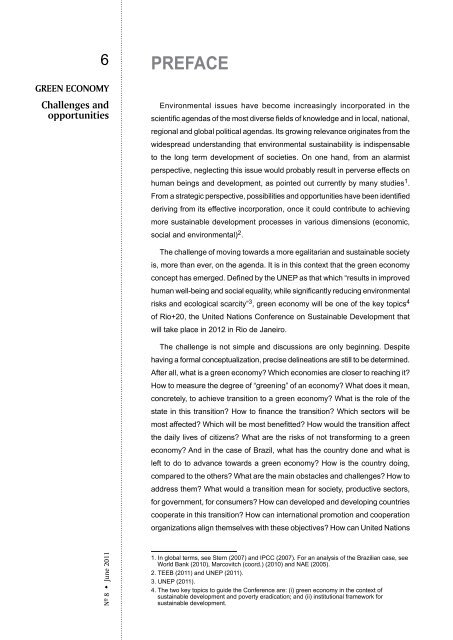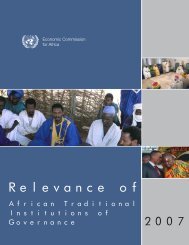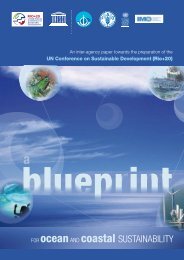Download Publication - Rio+20
Download Publication - Rio+20
Download Publication - Rio+20
Create successful ePaper yourself
Turn your PDF publications into a flip-book with our unique Google optimized e-Paper software.
6<br />
GREEN ECONOMY<br />
Challenges and<br />
opportunities<br />
Preface<br />
Environmental issues have become increasingly incorporated in the<br />
scientific agendas of the most diverse fields of knowledge and in local, national,<br />
regional and global political agendas. Its growing relevance originates from the<br />
widespread understanding that environmental sustainability is indispensable<br />
to the long term development of societies. On one hand, from an alarmist<br />
perspective, neglecting this issue would probably result in perverse effects on<br />
human beings and development, as pointed out currently by many studies 1 .<br />
From a strategic perspective, possibilities and opportunities have been identified<br />
deriving from its effective incorporation, once it could contribute to achieving<br />
more sustainable development processes in various dimensions (economic,<br />
social and environmental) 2 .<br />
The challenge of moving towards a more egalitarian and sustainable society<br />
is, more than ever, on the agenda. It is in this context that the green economy<br />
concept has emerged. Defined by the UNEP as that which “results in improved<br />
human well-being and social equality, while significantly reducing environmental<br />
risks and ecological scarcity” 3 , green economy will be one of the key topics 4<br />
of <strong>Rio+20</strong>, the United Nations Conference on Sustainable Development that<br />
will take place in 2012 in Rio de Janeiro.<br />
The challenge is not simple and discussions are only beginning. Despite<br />
having a formal conceptualization, precise delineations are still to be determined.<br />
After all, what is a green economy? Which economies are closer to reaching it?<br />
How to measure the degree of “greening” of an economy? What does it mean,<br />
concretely, to achieve transition to a green economy? What is the role of the<br />
state in this transition? How to finance the transition? Which sectors will be<br />
most affected? Which will be most benefitted? How would the transition affect<br />
the daily lives of citizens? What are the risks of not transforming to a green<br />
economy? And in the case of Brazil, what has the country done and what is<br />
left to do to advance towards a green economy? How is the country doing,<br />
compared to the others? What are the main obstacles and challenges? How to<br />
address them? What would a transition mean for society, productive sectors,<br />
for government, for consumers? How can developed and developing countries<br />
cooperate in this transition? How can international promotion and cooperation<br />
organizations align themselves with these objectives? How can United Nations<br />
Nº 8 • June 2011<br />
1. In global terms, see Stern (2007) and IPCC (2007). For an analysis of the Brazilian case, see<br />
World Bank (2010), Marcovitch (coord.) (2010) and NAE (2005).<br />
2. TEEB (2011) and UNEP (2011).<br />
3. UNEP (2011).<br />
4. The two key topics to guide the Conference are: (i) green economy in the context of<br />
sustainable development and poverty eradication; and (ii) institutional framework for<br />
sustainable development.

















